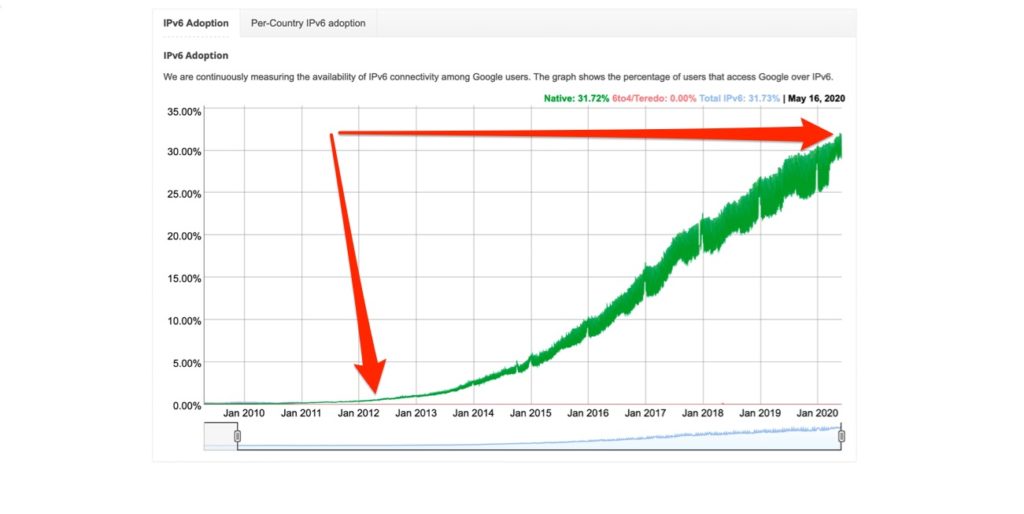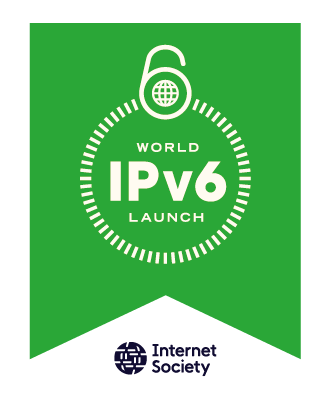June 2020 archive
Jun 20
TDYR 395 – Experimenting with Livestreaming on Twitch (A.k.a. Why I Haven’t Been Podcasting…)
Jun 12
Interview: IPv6 Buzz Podcast Episode 53 – Applications and IPv6
What is the current state of application support for IPv6? What are challenges for applications migrating to IPv6, particularly for enterprise applications? What am I doing at the Internet Society with projects such as Open Standards Everywhere to promote IPv6?
I had the fun of being interviewed by Scott Hogg and Tom Coffeen on their IPv6 Buzz Podcast episode 53 to talk about all of this and more. You can listen here:
Thanks to Scott and Tom, as well as their other host Ed Horley, for having me on the show to geek out about IPv6. Please do give the show a listen – and send along any questions you may have. Thanks!
Jun 12
Interview: IPv6 Buzz Podcast Episode 53 – Applications and IPv6
What is the current state of application support for IPv6? What are challenges for applications migrating to IPv6, particularly for enterprise applications? What am I doing at the Internet Society with projects such as Open Standards Everywhere to promote IPv6?
I had the fun of being interviewed by Scott Hogg and Tom Coffeen on their IPv6 Buzz Podcast episode 53 to talk about all of this and more. You can listen here:
Thanks to Scott and Tom, as well as their other host Ed Horley, for having me on the show to geek out about IPv6. Please do give the show a listen – and send along any questions you may have. Thanks!
Jun 12
Getting Close To Making Book Available on GitHub
With the changes to the book and my plans to develop a Second Edition, I also want to change the toolchain I’m using. When I wrote the book for O’Reilly back in 2011, I used DocBook XML as the source. However, these days I’m typically working in Markdown or another lightweight text markup format. So step one for the Second Edition is to migrate the DocBook XML into another format.
My current thinking is to use AsciiDoc, as it has support for footnotes and admonitions (ex. “Warning”), neither of which are supported in most Markdown variants. I’m still working through some plans, but hope to have the book converted over in the next few weeks. (I would welcome feedback on other text formats.)
I’m planning to make the book text available in a GitHub repository so that others can see the text and perhaps offer comments and feedback. If you would like to be notified when I do that, please sign up on my email list.
Jun 12
Getting Close To Making Book Available on GitHub
With the changes to the book and my plans to develop a Second Edition, I also want to change the toolchain I’m using. When I wrote the book for O’Reilly back in 2011, I used DocBook XML as the source. However, these days I’m typically working in Markdown or another lightweight text markup format. So step one for the Second Edition is to migrate the DocBook XML into another format.
My current thinking is to use AsciiDoc, as it has support for footnotes and admonitions (ex. “Warning”), neither of which are supported in most Markdown variants. I’m still working through some plans, but hope to have the book converted over in the next few weeks. (I would welcome feedback on other text formats.)
I’m planning to make the book text available in a GitHub repository so that others can see the text and perhaps offer comments and feedback. If you would like to be notified when I do that, please sign up on my email list.
Jun 10
Listen to the Hedge Podcast 39 to Learn about the Open Standards Everywhere Project

What is our Open Standards Everywhere (OSE) project all about? How did it get started? What are the project goals? What are some of the challenges web server operators face? How can we work together to make web servers more secure and available?
Recently Russ White and his team interviewed me on The Hedge Podcast Episode 39 to discuss all these questions and much more. I’ve known Russ for a good number of years and it was fun to talk with him and his co-hosts Eyvonne Sharp and Tom Ammon about all things related to the OSE project. I hope you enjoy listening to the episode as much as we enjoyed having the conversation!
I would encourage you to listen to some of the other Hedge podcast episodes, too, as they have some great content. A few I personally enjoyed included: episode 37 about DNS privacy; episode 31 about network operator groups (NOGs); and episode 30 with Ethan Banks from the Packet Pushers Network about why understanding the fundamentals of networking is so important.
Thank you to Russ, Eyvonne, and Tom for having me on the show!
Want to be more involved with the Open Standards Everywhere project?
- Test your web site(s) with Internet.nl.
- Read our draft documentation on GitHub – and engage in the issue discussion or contribute content. (You can watch/star the repository to be notified of updates.)
- Join our discussion community in Connect.
- Sign up to receive email updates by indicating your interest in the OSE Project through your member preferences. (Not an Internet Society member yet? No problem – it’s free and easy to join.)
- Read my introduction to the OSE project that dived into greater detail.
The post Listen to the Hedge Podcast 39 to Learn about the Open Standards Everywhere Project appeared first on Internet Society.
Jun 06
On this 8th World IPv6 Launchiversary, Help Us Get More Websites Available Over IPv6

Eight years ago, on June 6, 2012, thousands of companies and organizations came together as part of World IPv6 Launch to permanently enable IPv6 for their websites and networks.
Today, we can see the success! If you visit the World IPv6 Launch measurements site, you can see some amazing numbers:
- Reliance Jio’s network in India has over 90% IPv6 deployment!
- Comcast’s huge network in the US is at 73% IPv6.
- The combined US wireless carriers are over 85% IPv6.
- Deutsche Telekom is over 68% IPv6.
- Claro in Brazil is at 62% IPv6.
Another major source of info, Google’s IPv6 statistics, show that over 30% of all traffic to Googles sites globally is now over IPv6. If you look at Google’s per-country IPv6 adoption, some countries are seeing up around 50% of all traffic to Google’s properties going over IPv6.
This is all fantastic to see. But of course, we want more IPv6 deployment!
Specifically, we want more web sites and services available over IPv6. Increasing numbers of IPv6-only mobile networks are being deployed around the world. To ensure that people can reach websites that are still only available over IPv4, many IPv6-only networks use IPv6-to-IPv4 gateways. But we want everyone to be able to reach every website as fast as possible, without having to go through gateways, which can slow down access. So, we need more sites to have native IPv6 connections.
To do this, we need your help!
Is your site IPv6-ready? First, you can test your own web site(s) with the Internet.nl test site.
If Internet.nl says your site already supports IPv6, then congratulations! You are all set to have people connect over IPv6 to your site.
If your site does not support IPv6 yet, as part of our Open Standards Everywhere project in 2020, we are providing documentation to help people operating web servers make their sites available over IPv6.
We would like your feedback on the documents we have so far.
If you operate your own web server running on an actual server or a virtual machine, we have instructions for Apache or NGINX web servers.
If you are using a content delivery network (CDN) in front of your web server, the reality is that many CDNs already support IPv6 by default. We have a list of CDNs we know support IPv6. If your CDN is not on the list, please let us know! And if your CDN does not support IPv6, please let them know that these other CDNs do – and perhaps that you might consider switching. 
If you host your web site with a web hosting provider, we are looking to build a list of web hosting providers who do and do not support IPv6 for websites. We have an open issue on GitHub where we are seeking input.
In all of these cases, we would appreciate your feedback. If you use GitHub, you can open a new issue (or reply to a current one). Alternatively, you can send me email or contact me on Twitter.)
With your help, we can create even stronger documentation that can help even more people make their sites available over IPv6!
Want to be more involved with the Open Standards Everywhere project?
- Watch/star our ose-documentation repository on GitHub – and engage in the issue discussion or contribute content.
- Join our discussion community in Connect.
- Encourage other people to test their sites with Internet.nl.
- Indicate your interest in the OSE Project through your member preferences, to receive email updates. (Not an Internet Society member yet? No problem – it’s free and easy to join.)

The post On this 8th World IPv6 Launchiversary, Help Us Get More Websites Available Over IPv6 appeared first on Internet Society.


